
Saturday May 19, 2018
'It’s a blessing to have two countries – I can say I have Wales and all its traditions and culture but I have that as a Somali as well'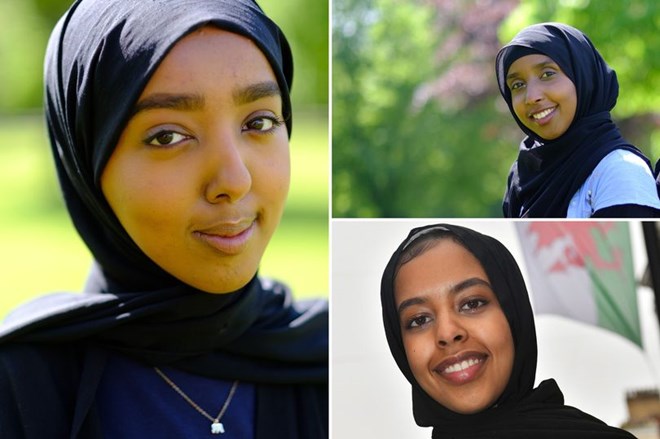
Fahima Omer speaks English, Welsh and Somali. She wears a hijab and black Converse trainers.
She’s 21 and from Grangetown in Cardiff and kind of from Hargeisa in Somaliland as well, even though they shout at her in English when she goes there because somehow they instinctively know.
Her mum and dad and sister fled the civil war in their homeland in the 1980s but she was born and bred in the Welsh capital.
And yet there’s no contradiction or conflict in any of her complex, continent-and-culture-spanning identity and family. She’s 100% Welsh Somali.
“It’s a blessing to have two countries,” said the former Willows High and St David’s College student.
“I can say I have Wales and all its traditions and culture but I have that as a Somali as well. In a way there are similarities between the countries.
“People say 'Where are you from?' and I always give two countries. Home is Cardiff, Wales, but also Hargeisa in Somaliland. But I feel more at home here because I have been here my whole life.”
More than a century after the first of her family’s countrymen and women first arrived in the docks of Wales’ capital in the 1880s the Somali community in Cardiff has grown to number in the thousands and become part of the city’s own identity.
Around 10,000 Somalis currently
live in Cardiff, according to latest figures from the International
Organisation for Migration, making it one of the largest populations in
the UK.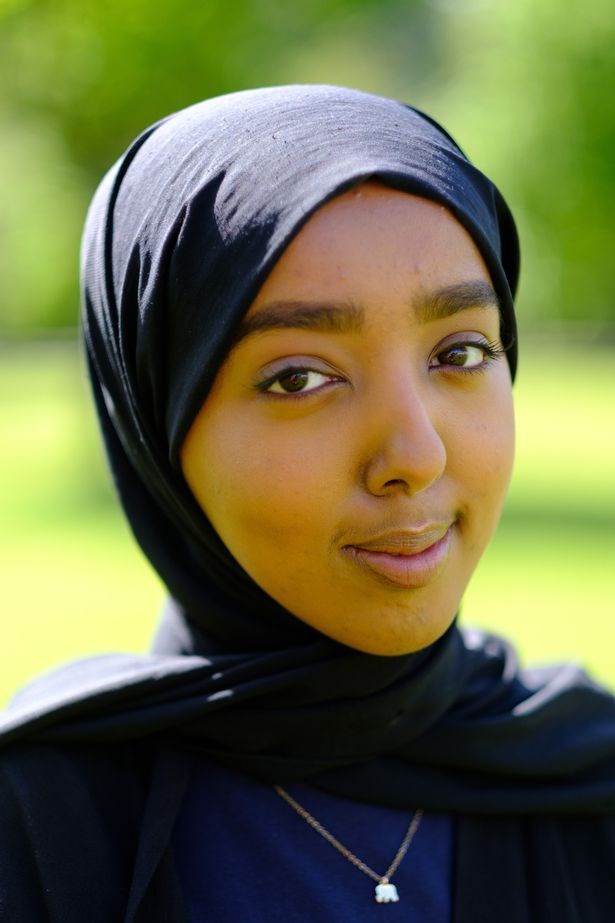 Fahima Omer
(Image: Mark Lewis)
Fahima Omer
(Image: Mark Lewis)
Many of them today are young and they grow up in diverse areas without experiencing some of the racism their parents were subjected to.
They grow up happy to be not just Welsh and Somali but belonging to a community that has its own identity forged over decades.
Her friend and fellow third-year Cardiff University student Sara Kalinleh, 20, whose family has been in Cardiff for four generations, said: “As a kid I thought nothing of being Welsh and Somali.
"It’s funny because when you go abroad no one knows where Wales is or what Somaliland is so I am always explaining where I am from.
“I have so many family here. Maybe that makes me feel more grounded.
“My great-grandfather came before any of the rest of us in the early 20th century and had kids. I am fourth generation but some of the younger generation in my family moved here from Somaliland as adults.
“I have so many family here. Maybe that makes me feel more grounded."
Sara, who went to Fitzalan High School, said: “I think being in the big community here we do discuss the fact that we are Welsh and Somali too a lot.
“It is fun having two countries. I have been trying to
explain our culture to English friends at university. They don’t
understand what a Welsh Somali is – but it’s what we are.”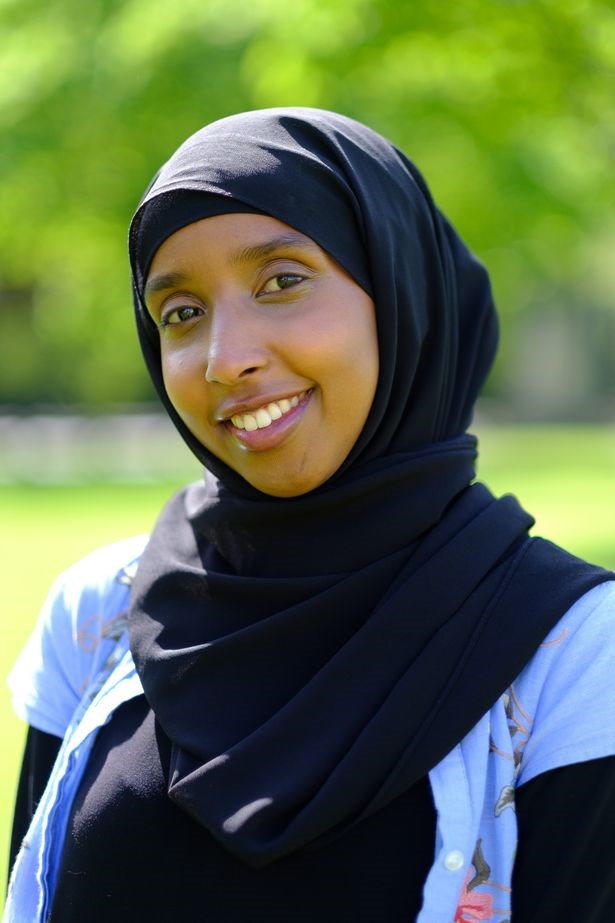 Sara Kalinleh
(Image: Mark Lewis)
Sara Kalinleh
(Image: Mark Lewis)
Fahima added: “Perhaps people understand themselves and their identity through the landscape?
“I feel at home when I see the hills around Cardiff and I say this is home – but I am also from Somaliland.
“I’ve only been to Somaliland twice for summer holidays when I was seven and 11 but it does feel like home too and I’m going again this summer.
“It was funny when I was there because when I was walking in the market in Somaliland people at the stalls grabbed me saying 'Buy, buy, buy' in English.
"I don’t know how they knew I am not from there but they just knew. I wasn’t even speaking. Maybe it was the way I walk and the way I am?
“I am studying English Literature and I’m doing an essay about culture and landscape and identity so I’ve been thinking about that and how I feel at home here.
“I have friends here who are English Somali students and they don’t understand.
"They wonder why there are signs with two languages for everything. But that’s normal for me.
"I think it is easier being Welsh Somali – they don’t identify as English Somali. There is a distinct Welsh culture and that helps.”
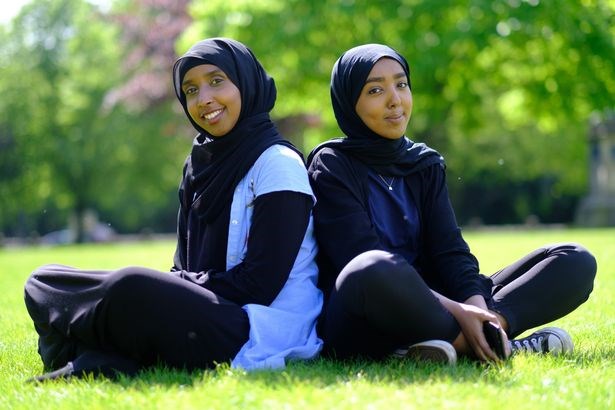 Sara Kalinleh, left, and Fahima Omer
(Image: Mark Lewis)
Sara Kalinleh, left, and Fahima Omer
(Image: Mark Lewis)Fellow Welsh Somali Nasra Ahmed, 19, whose family were born in Somalia, believes feeling proud of your family’s heritage is a very Cardiff thing.
She said: “I feel like because Cardiff, from what I see in Riverside and the Docks area, the multicultural areas, everyone is so proud of where they are from so it’s only right to say I’m proud of where I come from.
“And even when the media portrays my country in like a bad light I can say we’re not all like that so I have to just stick to my roots.
“I’m proud of being Somali and Welsh and I like that combination.
“I say I’m Welsh, from Cardiff – it’s better than saying I’m English.”
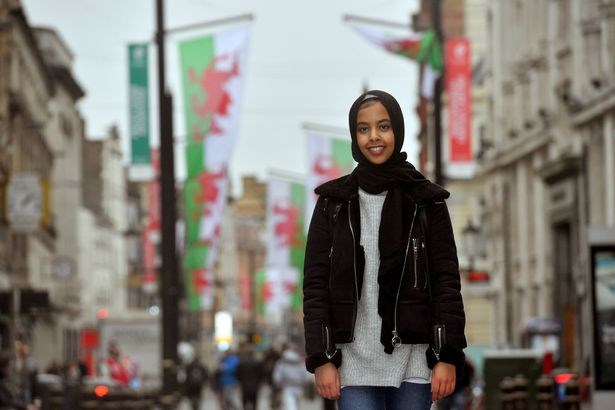 Nasra Ahmed
(Image: Rob Browne)
Nasra Ahmed
(Image: Rob Browne)
With Somali-born grandparents on her mum’s side and a half-Welsh half-Maltese grandmother on her dad's side, Nasra has never doubted her own identity.
She said: “Growing up I was always proud of being Somali, I was never embarrassed. Because I went to Kitchener Primary school where there was Bengalis, Pakistanis, whites, everyone just got along, there was nothing like that so everyone just got on.
“I felt very welcomed [and] I love screaming that I’m from Cardiff. Because Cardiff is not seen as a big city but now it’s like it’s getting there.”
A member of an older generation, Ahmed Hassan, 36, had a different reaction when he first started high school. One of only a few Somalis at Willows High School, he was subjected to racist abuse.
He said: “I went to Willows High school and there was probably only about 12 Somalis there then.
“They used to call me a Paki. It did affect my education. There were fights all the time and I was taught not to ever start on anyone.
“It was worse in year seven and it did get better after that.
“Thankfully I’ve never had a real problem with racism but with my youth work a lot of them come to me with these issues.
“I find it difficult to talk to them and to be real with them about it – I try and give them little doses to not knock them too much.”
For Ahmed, a change in the community’s identity came after the balance between the generations began to change.
He said: “It was different back then [when I was younger] because there were a lot more senior members of the community than younger people.
“There was a massive over-40s presence and not so much a young presence. We were spoilt a lot more then.
“Back then we were more Welsh than Somali I think. But when more Somalis started coming over, when the men would bring their wives and families and people fled the war, it started to change.
“People would go to the mosque more and start speaking the language more – you would have more of an identity.”
As with any community, there are often stark differences between generations – and for some young Somalis the struggle with identity can cause issues.
Ahmed said: “I would say that there is a fracture between the generations. And the reason is that we Somali, we are Welsh and we are Muslims and we all have ways of doing things.
“And the country that we are part of has values that are different. So what happens is things rub off on you, so you do have young people going out and drinking and sometimes the elders don’t understand.
“You have experimenting of course and sometimes it is just a phase and the elders may not see always that there is time for them (young people) to turn back.”
Like many minorities, the Somali community in Cardiff face being stereotyped – something Nasra said she tries to combat.
She said: “I feel like when someone relates to Somaliland/Somalia they just think about the pirates and al-Shabab and the terrorist groups but obviously they don’t represent our religion.
“Because more time it’s not down to the fact they are Somalis it’s about the religion aspect of it, so we’re just trying to get across the message that being a Muslim is a peaceful thing. We don’t like the violence.
“If someone tries to talk to me I try to educate them as much as I can.”
Nasra added: “We are not insulated at all. We chill with whites, Pakistanis, Bangladeshis, we chill with everyone.”
Nasra said some Somalis in Cardiff are unable to speak English and it is common for the younger generation to help translate for their parents.
Nasra said: “My mum speaks fluent English but I do hear stories sometimes like when the mother can’t speak English trying to get a doctors’ appointment, the kid will come and get the phone and explain in English.
“They explain it to their kid and then the kid relays it to the doctor.”
Abdinasir Musa, 21, added: “When I was growing up with my mum I would translate for her. But speaking now she is a lot more independent. She can order a taxi for herself and speak to people in the shop now.”
Although, as Abdinasir’s mum shows, the Somali community has continued to adapt to life in Cardiff their role in the capital city is again changing.
When Somalis first arrived in the city their work in the docks helped drive the engine of Wales and made Cardiff the prosperous city it is today.
Somali seamen undoubtedly directly benefited from the trade, pocketing good wages and building a life away from the troubles in their homeland.
Although some faced prejudice the community grew and integrated into the bustling life of Butetown and the surrounding areas, forging their own distinct identity that continues to develop and change as the city does around them.
Latest figures from the 2011 census found there were 101,000 Somali-born residents in England and Wales.
Many of these (36%) arrived during the 1990s following the Somali civil war in 1991. As the civil war continued Somali-born residents continued to emigrate, with a further 25% (25,700) of residents in 2011 arriving between 2001 and 2003.
Asylum applications from Somali nationals totalled 32,100 between 1991 and 2000 and 18,000 between 2001 and 2003.
As the cranes and towering apartment blocks increasingly loom over the once-again transforming city, the fear of the Somali community in Cardiff today is whether they will still be a part of the story of the Welsh capital in future.
Cardiff councillor Saeed Ebrahim, the first Somali councillor in Cardiff, fled the country to join his father in Wales aged around 10 in the 1980s.
Saeed, who grew up in the Butetown area, said: “My father was a seaman, my grandfather was a seaman, he was here in the 1930s.
“He worked in Cardiff and Barry Docks and my father followed the trend.
“My father never wanted us to be growing up in another land because I think he experienced difficulties of being in a land other than Somalia.
“But I think the curtains were closed as such when the civil war broke out and it was like this is the critical point and I have to get my family out.”
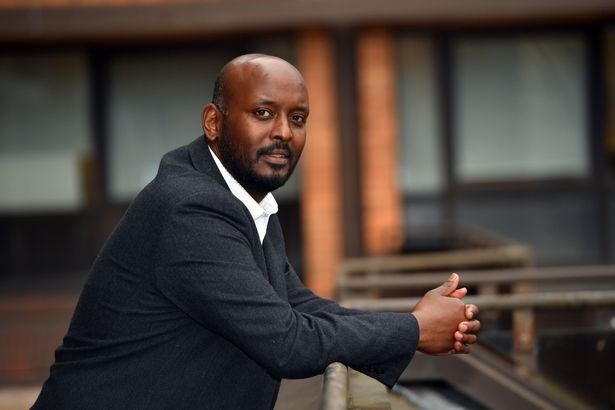 Saeed Ebrahim is the first Somali councillor in Cardiff
(Image: Rob Browne)
Saeed Ebrahim is the first Somali councillor in Cardiff
(Image: Rob Browne)
War broke out more than a decade after former policeman and soldier Siad Barre seized power in a military coup in 1969.
Hargeisa is in the northern part of Somalia, a former British protectorate given independence in 1960. The same year it joined with the southern part of Somalia, a former Italian colony, but Barre disliked the union and declared a socialist republic in 1969.
The Somali Liberation Movement fought against Barre, toppling him in 1991 and declaring the north an independent country – Somaliland.
The rest of the world does not recognise Somaliland’s independence and the civil war is still ongoing.
Here in Wales Somalis face a different fight.
Saeed said a “glass ceiling” still exists for young Somalis even after graduating from university and others said a lot of graduates need to leave to get a good job.
He said: “I think the youth of Cardiff have gone a bit ‘awol’, as they say, it’s kind of not here nor there, [they] haven’t caught up with their environment.
“On a positive note there are a lot of young people making a good transition in terms of education but as soon as they leave education going to a kind of a glass ceiling where jobs are not be found.
“I know a lot of young men and a few women who have travelled to Saudi Arabia to find work – just teaching English as a second language.
“However, looking at a situation where they are all based in the Butetown/Grangetown area, but you look at that surrounding area with all the companies and the jobs.
“Again it comes back to the questions that need to be raised.
“The Somali community, and all of Butetown, feel left out. There’s been a massive disconnect of the bay and the old Butetown.”
Again, direct figures for Somali employment in certain sectors are not available. But census data shows Butetown has a lower than Cardiff average of people employed in construction.
For Ahmed feeling left out from redevelopments springing up across the city is nothing new.
The dad-of-three witnessed the vast changes made to the Cardiff Bay area at the turn of the millennium.
Ahmed, who founded the Tiger Bay Youth Development organisation, said: “The development that has been around us, they have never provided jobs. It didn’t better our area. It’s gentrification.
“I think it will become a whole area of professional sorts with apartments that will cost a lot of money.
“It’s got to the stage where I’m over the disappointment. Our battle now is to educate our young people and that’s how we can beat the system.
“And maybe Cardiff can’t hold on to these people – but then Cardiff loses then.”
Some young Somalis have even questioned if the community will still exist in the coming decades.
Abdinasir said: “I do think that the community is being left out of Cardiff’s development. You see all these developments around this area it feels like we’re not a part of it.
“I’m only 21 but I think is our community still going to be here? Are they going to move everyone out of here?
“All the development down here before, we didn’t really get any of that. We never got a chance to see it.
“When I was younger I’d just go out near my home but when I got older I started to go further out and I saw these buildings. We felt left out.”
Speaking about the Somali and wider Butetown community, Saeed said during the development of the Bay more jobs should have been allocated for local people to help with integration.
He said: “By working with someone you get to know everything around them.
“All your misconceptions of whatever you had or what was in the media goes out of the window.
“They [the young] do raise issues with me. A lot of it is about issues of finding work, professional work.
“Now that I have children I think about how they will get on living in Wales. Time will tell.”
Saeed, who played at high level youth rugby in Cardiff growing up, said his community may not face daily discrimination on the streets but questions still need to be asked.
He said: “I didn’t really face any discrimination growing up, not really.
“If we look at the wider context of the community who have lived here for 200 years, I think the integration level in terms of job market and so forth, I think there should be a lot, lot more.
“I think you look at discrimination in different formats.
“You can look at it to the extent where how many people are employed in different sectors and at what levels.
“These are questions. I just think if someone says ‘I’ve never felt discrimination or racism’, well, yeah that might be okay personally, but I think when that person applies for jobs and sends that CV in and they have got their name on it and then someone deliberately puts it in the bin – you don’t know what happens behind closed doors.”
He added: “When you’ve got many families working as taxi drivers or in manual jobs or low-paid jobs, well that really doesn’t reflect a 200-year history.”
Although Abdinasir said he has never had a problem finding a job, this type of “invisible racism” is something he’s familiar with.
He said: “Everyone has problems getting jobs, everyone is trying and I’ve had plenty of jobs.
“But some people do discriminate and a lot of places will reject you. They’ll just look at your name on the CV. Even with postcodes as well.
“A lot of places will see CF10 or CF11 and think you’re trouble.”
Two residents – Abdi Aden and Hassan Essa – both came to Wales to work on the docks in the mid-20th century.
Working for around £20 to £30 a month, when rent was roughly £1.10 a week for a room, the pair recalled dozens of nationalities living side by side, gambling on street corners and widespread poverty.
Like many Somali seamen, Abdi, 81, travelled thousands of miles across the world transporting goods on trips and spending months or even years at a time on the sea.
He said: “When you come to Cardiff you come for the sea.”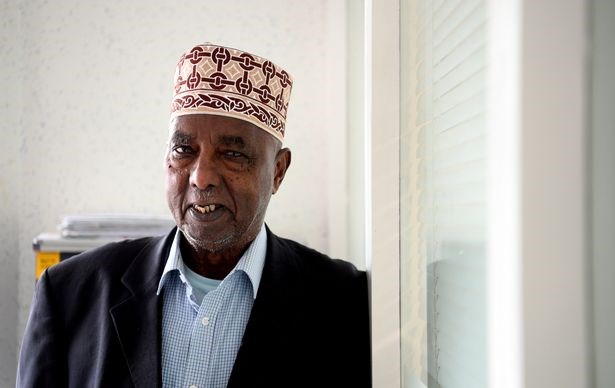
Abdi Aden
(Image: Richard Williams)
Before he retired in 1990, Abdi had visited America, France, Germany, Italy, Spain, Australia and the Middle East.
Although there are stories that Somalis were at one point unable to cross Mount Stuart Square into the city centre due to discrimination, Abdi and Hassan said they both felt welcome.
They say they never felt like they were part of a different city to people of different colours, they were all one.
Today, as the high-rise flat developments sprout across Cardiff Bay looking in every direction apart from towards the enclave of Somalis who still live in Butetown, they feel excluded.
Hassan, 93, said: “The people at that time, white people, the ones at that time in the 1950s, 1960s and 1970s were much better than the white people here today.
“They were more human. If you asked for directions, rather than directing you the person would take you there.
“There was no kind of putting people separate – everyone was the same.”